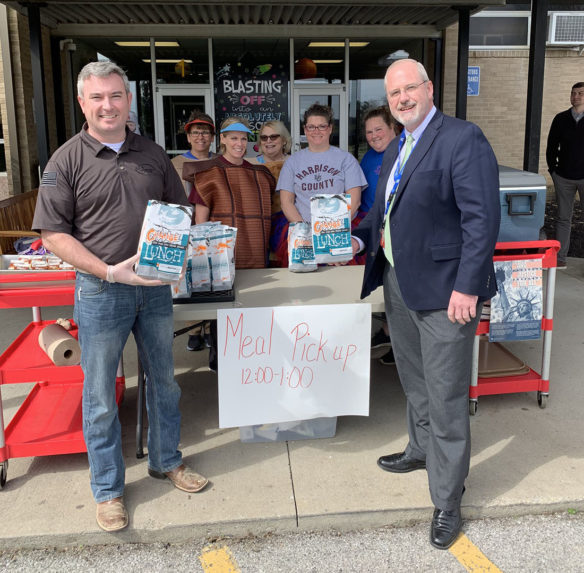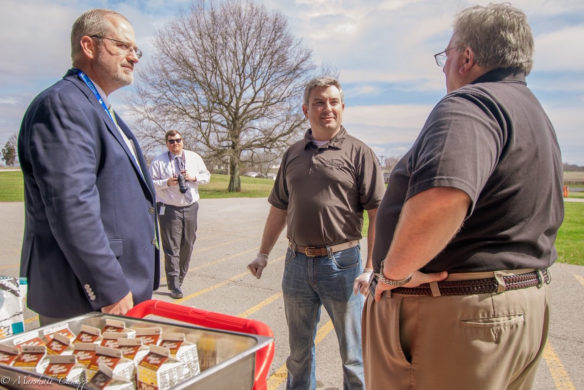
Harrison County Superintendent Harry Burchett, right, stands with Kentucky Agriculture Commissioner Ryan Quarles outside of one of the district’s two meal service locations. The Kentucky Department of Education received notification on March 14 from the U.S. Department of Agriculture that it had received approval to extend alternate meal service flexibility to students in the case of extended closures due to COVID-19.
Photo submitted
- Harrison County became the first district in the state to suspend in-person classes to prevent the potential spread of COVID-19.
- Now that COVID-19 cases have spread throughout the Commonwealth, many districts share concerns about what the plan will be if they already have used the majority of their NTI days.
By Jacob Perkins
Jacob.perkins@education.ky.gov
Harrison County Public Schools Superintendent Harry Burchett received the call Friday, March 6.
Everyone knew that Kentucky eventually would have a patient with the 2019 novel coronavirus (COVID-19). The only questions were when and where?
On that Friday, Gov. Andy Beshear confirmed the state’s first case of COVID-19 and the individual, it turned out, is a resident of Harrison County.
“We had a planning meeting with local leaders at the health department on Saturday morning (March 7),” Burchett said. “That’s when they relayed all of the information in regards to what was going on.”
Burchett had to act quickly.
“The information they relayed to us with regard to what the impact was on the medical community and the possible impact on the community as a whole helped us make our decision that we needed to cancel school for the upcoming week,” he said.
Harrison County became the first district in the state to suspend in-person classes in order to prevent the potential spread of COVID-19. As of March 16, there had been six confirmed cases in Harrison County.
“Our first and foremost priority has been the safety and well-being of our students, staff, and community,” Burchett said. “We have held true to that imperative. Our second priority has been the continuity of instructional and nutritional services.”
Utilizing the NTI Program
Burchett’s district was one of the 83 school districts approved to participate in the Non-Traditional Instruction (NTI) Program during the 2019-2020 school year. The program encourages the continuation of academic instruction on days when school would otherwise be canceled.
“All of the information, all of the NTI assignments and lessons, are on our website by grade and available at the start of the school year,” he said. “Because some of our student population doesn’t have internet access at home, we also have packet-based solutions.”
To not waste materials or overwhelm students and families, Burchett said the first five days of Harrison County’s NTI assignments are sent home in late October. These are in preparation for severe weather during the winter months.
“This year we were very fortunate, because we only missed two days of school for bad weather,” he said. “Additionally, we missed no days for influenza outbreaks or anything like that.”
In order to be approved for the NTI program, school districts must create innovative plans to deliver instruction to every student and provide for teacher interaction with students on NTI days. Districts submit documentation of the NTI days to the Kentucky Department of Education (KDE) and based upon that documentation, the commissioner of education can grant waivers for up to 10 NTI days to be included in the district calendar as student attendance days.
Now that COVID-19 cases have spread throughout the Commonwealth, many districts share concerns about what the plan will be if they already have used the majority of their NTI days. According to statute, districts are allowed a total of 10 NTI days per school year.
At the moment, there is bill in the General Assembly that would increase the number of NTI days to 20, which would give districts some additional relief if the legislation passes. If it does not pass, the KDE would ask Beshear for an executive order to increase the number of allowable NTI days to 20.
In addition, Interim Education Commissioner Kevin C. Brown announced on March 11 he would allow districts not participating in the NTI program to submit applications because of COVID-19. Brown added he would ask the Kentucky Board of Education on March 18 to grant a blanket waiver to a regulation that normally requires districts to submit applications for NTI at least 120 days prior to the beginning of a school year.
As of March 16, 171 of Kentucky’s 172 school districts, Kentucky School for the Blind and Kentucky School for the Deaf are utilizing or plan to utilize the NTI Program. The department has approved 166 of those emergency applications and is expecting to receive five more this week.
Providing More Than Instruction at Home
Back in Harrison County on that Saturday morning, Burchett knew he had to do more to help his students and their families. Although the district is small with approximately 3,000 students, 85% receive free meals daily.
“With an unplanned closure, we knew that we had to put something place to provide meal services for our students,” Burchett said. “We have two sites, Harrison County High School and Northside Elementary. At each one of those sites we have both a drive-thru and we also have the ability for a delivery service.”

Agriculture Commissioner Ryan Quarles, center, assisted Harrison County School Superintendent Harry Burchett, left, and other school officials with meal distribution due to school closures caused by COVID-19 (coronavirus). Burchett knew he had to do more to help his students and their families. Although the district is small with approximately 3,000 students, 85% receive free meals daily.
Photo by WCYN
To have food delivered, students or parents call in to their school and request delivery each day. Burchett said that the district utilizes a Google Form to track each request daily. School buses deliver the meals.
KDE received notification on March 14 from the U.S. Department of Agriculture (USDA) that it received approval to extend alternate meal service flexibility to students in the case of extended closures due to COVID-19. The waiver allows Kentucky’s schools to continue to serve students’ meals following the guidelines of the Summer Food Service Program and National School Lunch Program Seamless Summer Option at state-approved sites within the community, even if a school district is closed.
While this is tremendous news for Kentucky’s schools, Burchett said that regardless of the USDA decision, his students still would have been fed.
“The safety and well-being of our students, staff and community – and in this case the students – is the first and foremost priority. That includes nutrition,” he said. “We are going to continue to meet the needs of the community, with or without the promise of reimbursement.”
Attending to Mental and Physical Health
The well-being of Harrison County’s students has not only been evident in the food service program, but also with the implementation of a hotline for students to call for counseling and mental health needs.
“We’ve learned that we had some students that had some concerns, whether it be hypertension or nervousness or some specific situation that they may have that needed to be addressed,” said Burchett. “We knew that we needed to create a mechanism that would provide that service because this could be extended. We don’t know how long this is going to last.”
The district already had a bullying hotline for students that connects them with a counselor or a recording that is checked by a counselor periodically throughout the day. That hotline has now been repurposed to cover not only bullying, but also general counseling for students.
“Our school mental health and wellness team has worked out a schedule for them to man that hotline live,” Burchett explained. “They can forward the line to their own phone.”
Damien Sweeney, KDE’s program coordinator for comprehensive school counseling in the Office of Teaching and Learning said the work Harrison County has displayed is what is needed in Kentucky to get through this time.
“Harrison County is doing innovative work in order to set up a proactive approach for their students, family and community through this hotline,” Sweeney said. “This is the kind of work that makes an entire community proud to see their own school district concerned and taking action to provide the best care possible.
“We are hearing of many districts who are setting up ways for students and families to call in or even hold virtual meetings where the counselor, student and family can see each other while they meet virtually and would consider this as best practice.”
As the days go by more information about COVID-19 becomes available, but the fact of the matter is there are still a lot of unknowns.
“Let’s don’t operate on opinion and misinformation,” Burchett said. “Let’s look at the factual information that we can look at right now from around the world – in South Korea, Japan, the information that we have out of China and certainly Italy – let’s look at what is happening there and use that as reference to make informed decisions, which is what our public health officials are doing.
“This has to be taken seriously. These measures – and they do seem extreme to people, I get that – are being put into place by state and national health officials to get ahead of this thing.”
What advice does Burchett have for other districts as they begin NTI days and providing unconventional supports for students?
“Let your people lead with ideas and plan,” he said. “Solve the problems together. We are all much stronger when we work together.”
There is currently no vaccine to prevent COVID-19. The best way to prevent illness is to avoid being exposed to it in the first place. Remember these tips from the Department for Public Health:
- Avoid close contact with people who are sick (fever, cough, sneeze, and difficulty breathing). To avoid close contact, stay at least 6 feet away from others.
- Avoid touching your eyes, nose, and mouth.
- Stay home when you are sick.
- Cover your cough or sneeze with a tissue, then throw the tissue in the trash. To avoid coughing into your hands, you can cough into your elbow.
- Clean and disinfect frequently touched objects and surfaces using a regular household cleaning spray or wipe.
- Wash your hands often with soap and water for at least 20 seconds, especially after going to the bathroom, before eating and after blowing your nose, coughing or sneezing.
- If soap and water aren’t available, use an alcohol-based hand sanitizer with at least 60% alcohol. Always wash hands with soap and water if hands are visibly dirty.
- The Centers for Disease Control and Prevention states that wearing a facemask will not protect the public from COVID-19.
For more information about COVID-19, visit the Kentucky Department for Public Health’s website. For more information about COVID-19 as it relates to schools, visit the Kentucky Department of Education’s website.
MORE INFO …
Harry Burchett harry.burchett@harrison.kyschools.us
Damien Sweeney Damien.sweeney@education.ky.gov
From Kentucky Teacher:
- COVID-19: Answers to FAQs for Kentucky’s Schools and Districts
- COVID-19: Answers to FAQs for Kentucky’s Public School Families
- Interim Commissioner Kevin C. Brown’s March 13 letter to families
- USDA grants waiver to allow Kentucky schools to serve students off-site meals




Leave A Comment